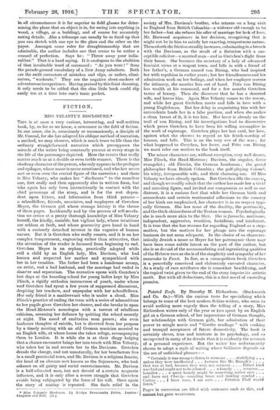belongs to some of the best modern fiction-writers, who seem
to avoid nothing more eagerly than the telling of a story, Miss Richardson writes only of the year or two spent by an English girl at a German school, of her impressions of German thought, her relationships with German girls, her admiration Qf their power to mingle music and " Goethe readings" with cooking and tranquil acceptance of future domesticity. The book is
certainly clever, true and intricate in its psychology, and so unexpected in many of its details that it is evidently the account of a personal experience. But the writer has unfortunately chosen to adopt a style of writing whose brilliance depends oil
the use of unfinished phrases :-
" Certainly it was wrong to listen to sermons . . . stultifying . unless they were intellectual . . . lectures like Mr. Brough's . . . that was as bad, because they were not sermons. . . . Either kind was had and ought not to be allowed . . . a homily . . . sermons . homilies . . . a quiet homily might be something rather nice • . . and have not Charity—sounding brass and tinkling cymbal . . Caritas . . . I have none, "I am sure. . . . Fraulein Pfaff would listen."
Pages in succession are filled with sentences such as this, and cannot but grow wearisome.


































 Previous page
Previous page